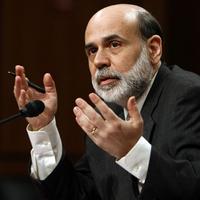|
Clitoral Economics
by Barbara Ehrenreich via rialator - alternet Tuesday, Jan 22 2008, 1:37pm
international /
social/political /
other press
With all the talk about how to stimulate it, you'd think that the economy is a giant clitoris. Ben Bernanke may not employ this imagery, but the immediate challenge--and the issue bound to replace Iraq and immigration in the presidential race--is how best to get the economy engorged and throbbing again.

Bernanke body language
It would be irresponsible to say much about Bush's stimulus plan, the mere mention of which could be enough to send the Nikkei, the DAX, and the curiously named FTSE and Sensex tumbling into the crash zone again. In a typically regressive gesture, Bush proposed to hand out cash tax rebates--except to families earning less than $40,000 a year. This may qualify as an example of what Naomi Klein calls "disaster capitalism," in which any misfortune can be re-jiggered to the advantage of the affluent.
But even the liberal stimulus proposals have me worried--not so much for their content as their rationale. Most liberals want a stimulus package that includes an increase in food stamp allotments and an extension of unemployment benefits, which are both screamingly obvious measures. Currently, the food stamp allotment amounts to about $1 per meal, and when four Democratic congresspersons tried living on that for a week last May they ended up even crankier than if they'd had to sit through a week-long filibuster by Tom DeLay.
As for unemployment benefits: They last just twenty-five weeks in most states and end up covering only a third of people who are laid off. If ever there was a time to create a real working system of unemployment compensation, it is now. Citigroup has announced plans to eliminate 21,000 jobs; investment banks in general will shed 40,000. The mortgage industry is in a state of meltdown; and Sprint--how did they get into this?--will lay off 4,000 full-time employees as well as 1,600 part-time and contract workers.
The economic rationale for more a progressive stimulus package, which we hear now several times a day, is that the poor and the freshly unemployed will spend whatever money they get. Give them more money in the form of food stamps or unemployment benefits and they'll drop more at the mall. Money, it has been observed, sticks to the rich but just slides off the poor, which makes them the lynchpin of stimulus. After decades of hearing the poor stereotyped as lazy, stupid, addicted, and crime-prone, they have been discovered to have this singular virtue: They are veritable spending machines.
All this is true, but it is also a form of economy fetishism--or should I say worship? If we have learned anything in the last few years, it is that the economy is no longer an effective measure of human well-being. We've seen the economy grow without wage gains; we've seen productivity grow without wage gains. We've even seen unemployment fall without wage gains. In fact, when economists want to talk about life "on the ground," where jobs and wages and the price of Special K are paramount, they've taken to talking about "the real economy." If there's a "real economy," then what in the hell is "the economy"?
Once it was real-er, this economy that we have. But that was before we got polarized into the rich, the poor, and the sinking middle class. Gross social inequality is what has "de-coupled" growth and productivity from wage gains for the average household. As far as I can tell, "the economy," as opposed to the "real economy," is the realm of investment, and is occupied by people who live on interest and dividends instead of salaries and wages, aka the rich.
So I'm proposing a radical shift in rhetoric: Any stimulus package should focus on the poor and the unemployed, not because they spend more, but because they are in most in need of help. Yes, when a parent can afford to buy Enfamil, it helps the Enfamil company and no doubt "the economy" too. But let's not throw out the baby with the sensual bubble bath of "stimulus." In any ordinary moral calculus, the baby comes first.
Far be it from me to make the revolutionary suggestion that babies are more important than profits. My point is just that our economy--with its dizzying bubbles, wild lending sprees, reckless downsizings, and planet-wide hyper-sensitivity--has gotten too far disconnected from ordinary human needs. We could take the current crisis as an opportunity to fix that, at least in part, by shoring up government support for the needy and the dislocated. Or we can wait around and watch while the appropriate imagery gets nasty, as this ghostly creature, "the economy," starts acting like a nymphomaniac junkie in withdrawal.
Barbara Ehrenreich is the author of thirteen books, including the New York Times bestseller Nickel and Dimed. A frequent contributor to the New York Times, Harpers, and the Progressive, she is a contributing writer to Time magazine. She lives in Florida.
Author retains copyright
http://www.alternet.org/workplace/74595/
<< back to stories
|